
This article was paid for by a contributing third party.More Information.
From ‘glut effects’ to ‘greedflation’: the factors shaping derivatives markets in 2024
Societe Generale (SG) and Risk.net held the ninth edition of their annual flagship Derivatives Conference in the iconic SG Towers at La Défense. Usually hosted in London, the event was co-sponsored by the CME Group and took place in Paris for the first time, coinciding with the first semifinal of the Rugby World Cup, of which SG is a key sponsor.
The Derivatives Conference brought together institutional investors such as asset managers, hedge funds and pension funds on the one side, and market experts from academia, global research, derivatives trading and financial structuring on the other. Focused on innovation and thought leadership, this one-day conference welcomed more than 350 finance professionals from over 25 countries.
Insight and thought leadership at its best
One of the most memorable moments of the conference was the keynote speech by the world-renowned thinker and philosopher Nassim Nicholas Taleb, a former options trader, risk analyst and author of a series of bestselling books, including Fooled by Randomness, The Black Swan and Antifragile. A key message from his hour-long presentation was that “life is long gamma” or long convexity, and that non-linear progressions are not only recurring phenomena in nature but also in life – and financial markets in particular.
Taleb discussed a few examples, noting that the surge in inflation in 2022 was triggered by “glut effects”, caused by supply chain disruptions in the months following the Covid-19 pandemic lockdowns, when revenge spending was met with constrained supply. Central banks then embarked on an aggressive tightening cycle, when inflation turned out to be more persistent and less transitory than expected by market participants. This caused sovereign bondholders to realise – to their horror – they were running short volatility positions of greater size than they ever imagined. Risk-free assets became the main source of risk, wreaking havoc on multi-asset funds and regional banks, such as Silicon Valley Bank.
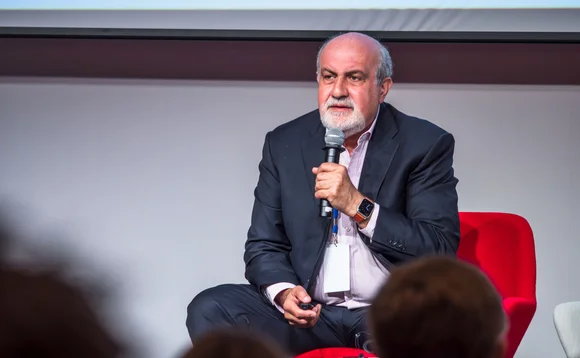
Another interesting example of convexity was discussed in the Q&A session on climate change. Humans themselves are a fundamentally short climate volatility risk, with every aspect of our current socio-economic world order relying on predictable and stable weather patterns. Climate tail events are not currently fully accounted for in most risk models.
The multi-asset panel was a further highlight of the day. Kokou Agbo-Bloua, global head of economics, cross-asset and quant research at SG, moderated a lively exchange on the topic of Generating alpha when risks are known unknowns with panellists Xavier Baraton (global chief investment officer at HSBC Asset Management), Frédéric Leroux (head of multi-asset at Carmignac), Laura Cooper (cross-asset strategist at BlackRock), Eric Bendahan (founder and non-executive chairman of Eleva Capital) and Erik Norland (senior economist at CME Group).
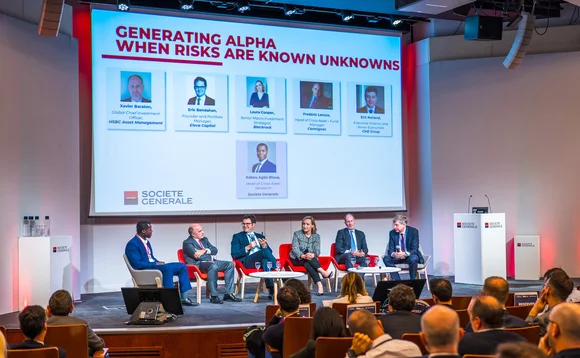
There was broad consensus that higher-for-longer interest rates were needed to bring core inflation back to target„ with the transmission mechanism of monetary policy now longer than the typical three to five quarters. Four main causes were identified: excessive government spending to partially shield consumers from the cost-of-living crisis; cumulative excess savings acting as a shock absorber for households; ‘greedflation’ or strong pricing power for businesses, fuelling higher profit margins; and corporations having locked in low interest by refinancing in 2022, therefore becoming temporarily immune to higher rates. Views diverged more on how fast inflation would normalise and whether this was the beginning of a new regime of higher structural inflation for longer, especially with ‘greenflation’, as massive investments are being made to transition our economies from fossil fuels to metal-intensive renewable energy.
Professor Claudia Senik, research fellow at the Paris School of Economics, was the second keynote speaker and addressed the thorny question of “When is social inequality (un)acceptable?” She shared some insights on social norms, as well as drivers of happiness and wellbeing in society, highlighting that GDP growth decorrelates from societal wellbeing at a specific GDP per capita threshold, while social networks and interactions are more reliable predictors of collective wellbeing.
The second panel of the day yielded a fascinating discussion on the future of artificial intelligence (AI) and its potential for significant disruption, with Valérie Coscas (head of Amazon Web Services), Mark Shmulik (head of tech sector research at AB Bernstein) and Claire Calmejane (chief innovation officer at SG). Rolling out disruptive technologies requires consistency and investment. While the ChatGPT4 adoption rate has been impressive, one should be mindful of the ‘Schumpeterian’ forces of creative disruption and the economic incentives of current incumbents, Google and Microsoft. However, AI replacing humans may be a case of “nothing to fear but fear itself”, at least in the short term.
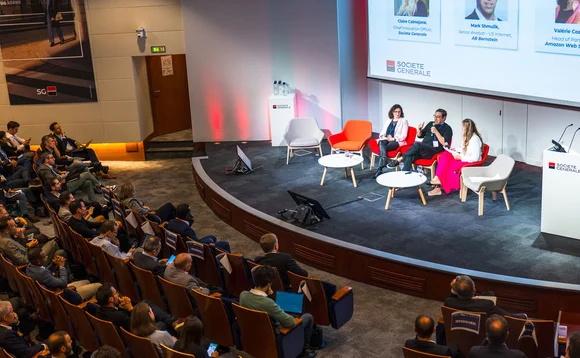
In the afternoon, participants were able to attend a dozen workshops with investment experts for a deep dive into some of the specific themes across product and asset classes. The topics ranged from cross-asset volatility opportunities to hedging inflation, thematic baskets focused on the green transition, decarbonisation of multi-asset portfolios and making an impact with data.
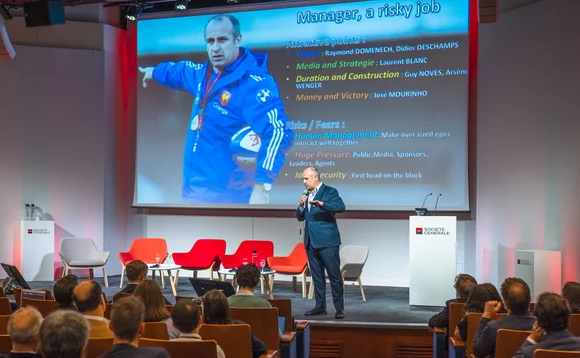
Anne-Christine Champion, co-head of SG Global Banking and Investor Solutions, and member of SG’s executive committee, reaffirmed in her conference opening remarks the group’s most recent commitments to environmental, social and governance (ESG) highlighted why climate change required more from everyone and why all market participants have a part to play.
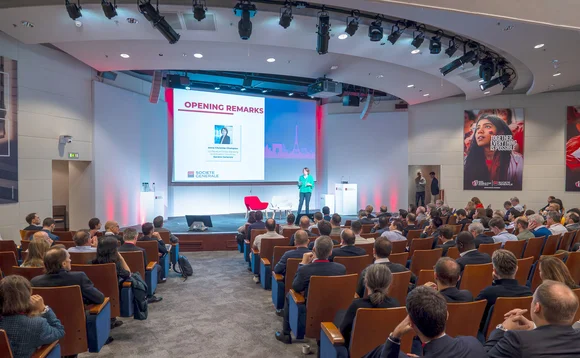
At the end of the conference, Hatem Mustapha, co-head of Global Markets, made some closing remarks by thanking SG’s clients, its key partners Risk.net and CME Group, the world’s leading derivatives marketplace, and all of the speakers. While the certainty of an uncertain future was a key takeaway of the conference, he reminded the audience of another certainty: Global Markets’ commitment to its clients.
The art of predicting the future
John Kenneth Galbraith once described forecasters as falling into one of two categories: “Those who don’t know and those who don’t know they don’t know”. While predicting the future is a challenging endeavour, anticipating, understanding and hedging the wide range of possible outcomes is where SG excels. Building long-term and holistic partnerships with its clients across asset classes and regions with an advisory mindset has been a key differentiator for SG, as opposed to the pure liquidity provider approach that some of its competitors have chosen.
Being cross asset constitutes SG’s key competitive advantage, anchored by its award-winning cross-asset research team, and its sales structuring and sales solutions platform. Innovation and creative solutions around ESG and the energy transition have also enabled SG to develop niche expertise in both its global market activities and global financing business.
Sponsored content
Copyright Infopro Digital Limited. All rights reserved.
You may share this content using our article tools. Printing this content is for the sole use of the Authorised User (named subscriber), as outlined in our terms and conditions - https://www.infopro-insight.com/terms-conditions/insight-subscriptions/
If you would like to purchase additional rights please email info@risk.net
Copyright Infopro Digital Limited. All rights reserved.
You may share this content using our article tools. Copying this content is for the sole use of the Authorised User (named subscriber), as outlined in our terms and conditions - https://www.infopro-insight.com/terms-conditions/insight-subscriptions/
If you would like to purchase additional rights please email info@risk.net
